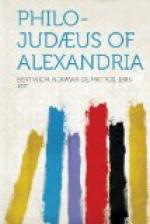between letter and spirit, faith and works, is in
truth a false one; and wherever the significance of
Judaism has been fully comprehended, the two aspects
of the law have been inextricably intertwined.
As Philo understood the Jewish mission, it was not
merely to diffuse the Jewish God-idea, but quite as
much to diffuse the Jewish attitude to God, the way
of life. Abstract ideas, however lofty, can never
be the bond of a religious community, nor can they
be a safeguard for moral conduct. Sooner or later
congregations must submit themselves to some law,
be it a law of dogma, or be it a law of conduct.
Antinomianism, the opposition to the law, to which
Paul later gave powerful, even fanatical, expression,
was a strong movement at Alexandria in Philo’s
day. Preparatory to the spread of Christianity,
numerous sects sprang up there which purported to follow
a spiritual Judaism wherein the law was abrogated because,
forsooth, its symbolism was understood! In the
extreme allegorists, whom Philo attacks for their
shallowness, one may discern the prototypes of the
Cainites, Ophites, Melchizedecians, and the rest of
the heretical parties that produced the religious
chaos of the next centuries. From that welter
of opinions there at last emerged dogmatic Christianity.
The Christian reformers came to free man from the yoke
of the law; but their successors imposed on the mind
the fetters of dogma, and, in order to check the passions
of the body, advocated renunciation and asceticism.
So that not only Judaism as a system of belief, but
Judaism as a system of life was lost in their handiwork.
Spirituality lacking knowledge and allegorism in excess
led to this result. In Philo they are controlled
by affection for the Torah, and by a conviction of
the need for national cohesion.
Philo is loyal to the Jewish tradition not only because
he had a deep feeling for what a modern teacher has
called the catholic conscience and the historical
continuity of Judaism, but because his philosophy
was based on a conviction that the Jewish religion
was the truest guide to conduct and righteousness
and to the love of God. To him, as to Plato and
Aristotle, the law was the outward register of the
moral ideal; the “word-and-deed symbols”
of ceremonial and prayer were emblems indeed of moral
principles, but at the same time they had an intrinsic
value, in that they impressed these principles upon
the mind, and brought belief and action into harmony.
“Religion is law, not philosophy,” said
Hobbes. With Philo, religion is law and
philosophy. Thus the love of the Torah is of the
essence of his religious thought. As he puts
it in the exhortation to his fellow-ambassadors before
Gaius,[170] “to die in defence of it is a kind
of life.” In his philosophical Judaism he
sought always for the universal and the spiritual,
but so as always to increase the honor of the law,
and not only of the law but of the customs of his ancestors,
thinking with the Psalmist that “the Torah is
a tree of life to those who keep fast hold of her,
and those who support her are blessed.”




